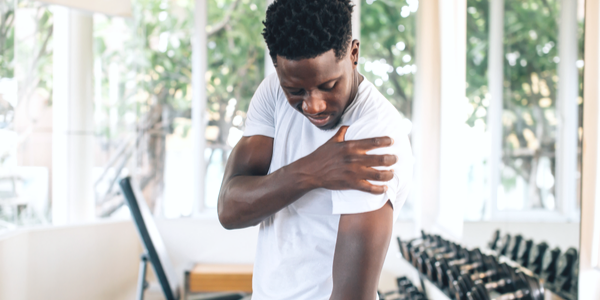
It may be just a head cold, slight sore throat, fever, or stomach ache. Maybe an illness is not enough to completely knock you down, and you do not want to miss out on exercise gains. However, pushing through a workout may sometimes backfire and set recovery further back.
So, should you push through and work out when sick or sore? Or is it best to rest?
Take a closer look at all the considerations to determine if you should exercise when sick or if it's better to skip it!
Should You Workout When Sick?
Exercise has many health benefits including boosting immune system health. In fact, some studies have shown moderate exercise to be associated with lowered risk and severity of upper respiratory infections. However, pushing through exercise when not feeling well may prolong recovery time.
It may be tempting to not want to miss a day of exercising even if sick. One thing to remember is you will not be able to work out as hard when feeling under the weather as when healthy. So, is the workout still necessary when sick?
Answering the question of whether you should work out when sick will depend on where symptoms are on the body and how severe they are. Of course, it is always recommended to consult your doctor for individual guidance, but here are some general recommendations to guide decisions for exercising when sick.
Symptoms Above the Neck
If experiencing head cold symptoms or a sore throat, working out is usually fine when sick. In fact, running with a cold may help clear out a stuffy nose. Keep in mind you should plan on exercising at a lower intensity compared to when feeling normal.
Do not schedule harder training days when feeling sick, save them for when you feel better. Start off a workout slowly when under the weather and if feeling ok, increase intensity as desired. However, if feeling miserable and unduly fatigued, stop exercising.
Symptoms Below the Neck
If sick with a cough, fever, body aches, or upset stomach, it is best to not work out when sick. When symptoms are below the neck, it is best to rest, hydrate, take medication if needed and eat foods that will help heal the body.
When these symptoms are present, the body is using extra energy to fight off illness. Adding exercise on top of this could delay healing, increase fatigue, or make symptoms worse. Give the body time to heal and note exercise capacity may not be back to normal until days or weeks after being sick, depending on the severity of illness.
Do not think sweating with exercise can expedite healing with a fever. The old wives’ tale of sweating out a fever with exercise is a myth notes Dr. Cardone, DO NYU Langone sports health specialist in an April 2020 article.
Should You Workout with COVID?
In general, the same rules apply for determining if you should work out while sick with COVID if exercising at home or in open spaces not near other people. How severe are symptoms? Are symptoms above or below the neck?
As a BMJ Open Sport & Exercise Medicine 2021 article suggests, an important consideration for working out with COVID is of course exposing others to illness. Athletes competing in enclosed spaces should consider staying home instead of exercising to limit exposure to others around them.
Should You Workout When Sore?
Similar to being sick, it is not always wise to work out when feeling sore and expect muscles to perform the same when not at their prime. Determining if you should exercise while sore depends on the severity. A little soreness can be accommodated by working different muscles than the sore ones or doing light physical activity that will not further damage the muscle.
For example, if your legs are feeling sore, focus the workout on the upper body and core exercises. Walking or a light jog can be done in place of more strenuous cardio exercise.
To help heal sore muscles, Orlando Health suggests taking Epsom salt baths, getting a massage, alternating between ice and heat, eating a nutritious diet, and getting enough sleep.
Consistently not allowing muscles time to heal and recover from soreness can increase the risk for injury. It can also lead to a condition called overtraining which ultimately leads to a decline in athletic performance accompanied by increased fatigue.
Creating a workout plan that varies muscle group exercises and allows for a variety and balance of work and rest can help minimize sore muscles stopping you from working out.
In Summary: Working Out When Sick or Sore
While working out can be done when feeling sick or sore, it should be done with caution and lowered expectations. If sick symptoms are above the neck, it is likely ok to work out while sick. Just note time and/or intensity should be lowered compared to when feeling normal.
If sick symptoms are below the neck, it is best to not work out and let the body heal before resuming exercise. It may take days or weeks to feel back to normal depending on the severity of the illness.
When feeling sore, alter exercise to focus on other muscle groups or lessen the intensity of exercise until muscles feel recovered. Overall, tune in and listen to your body - it is pretty smart on telling you what it needs, rest especially!
References:
Fallon K. Exercise in the time of COVID-19. Aust J Gen Pract. 2020;49:10.31128/AJGP-COVID-13. Published 2020 Apr 22. doi:10.31128/AJGP-COVID-13
Orchard JW, Orchard JJ, Puranik R. Stay home when sick' advice: implications for sport and exercise. BMJ Open Sport & Exercise Medicine. 2021;7:e001227. doi: 10.1136/bmjsem-2021-001227
Should I still work out when I'm sore? Orlando Health - One of Central Florida's Most Comprehensive Healthcare Networks. Published April 2, 2020. https://www.orlandohealth.com/content-hub/should-i-still-work-out-when-im-sore.
When it's safe to exercise after getting sick. NYU Langone News. https://nyulangone.org/news/when-its-safe-exercise-after-getting-sick. Published April 12, 2020.







